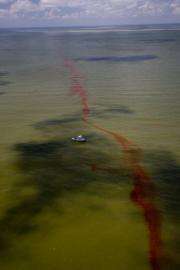This BP handout image shows a boat scouring the surface of the Gulf of Mexico off the Grand Isle area of Louisiana, May 22. Oil giant BP pledged up to 500 million dollars (405 million euros) to study the impact of the Deepwater Horizon rig spill on the Gulf of Mexico environment.
Oil giant BP pledged Monday up to 500 million dollars (405 million euros) to study the impact of the Deepwater Horizon rig spill on the Gulf of Mexico environment.
The commitment came as BP faced mounting pressure to check the massive oil leak, after the US government threatened to take over the response to the month-old disaster.
A 10-year research programme would study topics including how oil and the chemicals used to disperse it were affected by ocean currents, and how they were dispersed in the sea and on shore.
"BP has made a commitment to doing everything we can to lessen the impact of this tragic incident on the people and environment of the Gulf Coast," BP chief executive Tony Hayward said in a statement.
"We must make every effort to understand that impact. This will be a key part of the process of restoration, and for improving the industry response capability for the future," he added.
The research programme would also examine how accidental oil spills compare to natural seepage from the seabed, whether chemicals used to disperse the oil helped or hindered biodegradation, and what can be done improve technology.
The BP-leased Deepwater Horizon rig exploded on April 20, killing 11 workers, and sank two days later. Ever since, hundreds of thousands of gallons of oil, perhaps even millions, have spewed each day into the sea, threatening marine and shore-based wildlife, fishing industries and tourism.
BP's statement said it already has ongoing marine research programmes in the Gulf of Mexico.
"Building on these, BP will appoint an independent advisory panel to construct the long term research program. Where appropriate, the studies may be coordinated with the ongoing natural resources damages assessment," it said.
"The program will engage some of the best marine biologists and oceanographers in the world. More immediately, a baseline of information for the long term research program is needed."
Initially a grant to Louisiana State University (LSU) will help kick start the work, BP said.
"LSU has a significant amount of experience in dealing with the oil and gas industry and deep knowledge pertaining to the Gulf of Mexico," said Professor Christopher d'Elia, dean of LSU's School of the Coast and Environment.
"The first part of the program is about obtaining and analyzing samples and assessing immediate impacts. Other areas of importance will emerge as researchers become engaged and the potential impacts from the spill are better understood," said d'Elia, cited by BP.
(c) 2010 AFP























